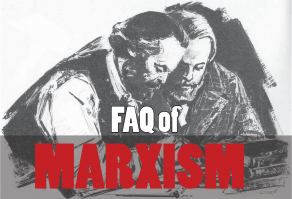We re-publish the third in George Collins’ series of articles on the degeneration of the Soviet Union and the rise of Stalinism. Here, he describes the theoretical battle over the Stalinist distortion of ‘socialism in one country’, and Trotsky’s principled defence of Marxist internationalism. Read part one here, and part two here.
The Invention of ‘Trotskyism’
The party bureaucracy resorted to vote-rigging to exclude Opposition delegates from the thirteenth conference in January 1924, where the inner-party debate was to be decided.
In Moscow, for example, the Opposition had majority support in most of the cells (branches). In the regional elections, despite ruthless weeding out of Opposition supporters by Stalin's appointed secretaries, 36 percent of the vote still went to the Opposition. Yet, at the provincial level, this vote was mysteriously halved.
From the whole of the USSR, only three Opposition delegates managed to get into the conference!
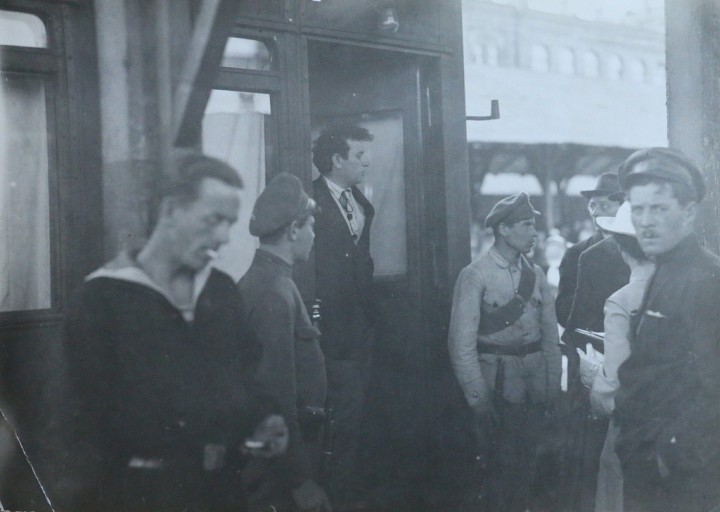 Zinoviev: the inventor of Trotskyism / Image: public domain
Zinoviev: the inventor of Trotskyism / Image: public domain
Then came the news of Lenin's death. The mass of workers and youth were plunged into even deeper gloom, while the bureaucracy immediately felt themselves in a stronger position.
The triumvirate now set out to defeat the Opposition's power base among the party activists. Supposedly in tribute to Lenin, they threw the party open to workers – had not Trotsky criticized the fact that only 15 percent of the membership were workers?
Between February and May 1924 some 240,000 workers were admitted. This so-called ‘Lenin levy’ was, in fact, a mockery of the method of party-building that Lenin had developed.
As the party congress had explained in 1919:
"The Communist Party is the organization which unites in its ranks only the vanguard of the proletariat and the poorest peasantry – that part of these classes which consciously strives to realize in practice the communist program.
"The Communist Party makes it its task to win decisive influence...in all organizations of workers..."
Flooding the party with raw recruits went directly counter to this task – but it served another purpose. The ‘Lenin levy’, the trio calculated, would in the first place provide them with voting fodder to swamp the Opposition. Inexperienced members, confronted with unfamiliar problems, will tend to follow the lead they are given. Very few would feel able to challenge the Politbureau.
As in Russia, there was strong support for the Opposition in the Communist parties internationally. The central committees of the mass-based French and Polish parties, for example, protested against the attacks on Trotsky.
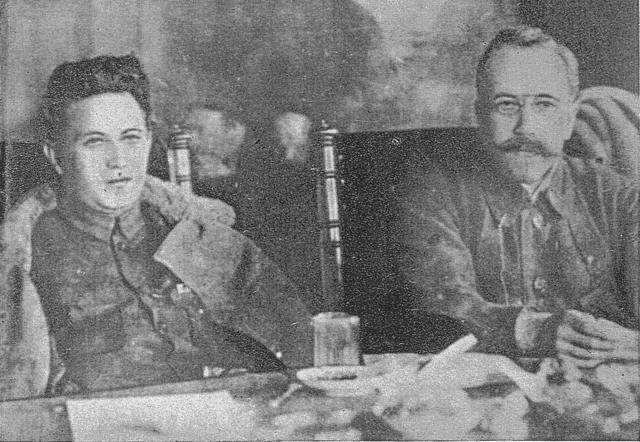
The triumvirate could not tolerate this. Zinoviev, as Comintern president, ruthlessly abused his position, disbanding the leading bodies of national parties to get rid of Trotsky's supporters – under the slogan of ‘Bolshevization’!
Yet the bureaucracy could not feel secure as long as Trotsky, with his giant authority as theoretician and co-leader of the October revolution, continued to subject their opportunism and blunders to merciless Marxist criticism. It was essential for the Zinovievites and Stalinists to rewrite history and cover Trotsky's name in mud.
Their tactic was to invent ‘Trotskyism’ (a phrase coined by Zinoviev in December 1923). This consisted of raking up each and every past difference between Lenin and Trotsky in order to insinuate that Trotsky had ‘always’ been opposed to Bolshevism.
Trotsky was reviled as a Menshevik (after the confusing split between the Bolsheviks and Mensheviks in 1903 he had, for a few months, found himself in the Mensheviks' camp before the political differences between them became clear) and also as an ultra-left! In particular his theory of permanent revolution was seized on to demonstrate his ‘petty-bourgeois deviation from Leninism’.
In fact, Trotsky's fundamental disagreement with the Mensheviks was precisely the basis for his political alliance with Lenin in 1917 and after.
The Mensheviks, Trotsky explained, "took as their point of departure the idea that to the liberal bourgeoisie...belonged the leading role in the bourgeois [democratic] revolution. According to this pattern, the party of the proletariat was assigned the role of Left Wing of the democratic front." (Introduction to The Permanent Revolution, page 3).
From this it followed that the revolution should be carried out in two stages: first, a "democratic" stage (on the basis of capitalism); and only at some point in the future would "socialism" be on the agenda.
Trotsky rejected this mechanical formula and developed his own analysis of the character of the revolution in a backward country such as Russia. This analysis, brilliantly confirmed by the October Revolution, became known as the theory of ‘permanent revolution’.
"In the event of a decisive victory of the revolution," Trotsky wrote in 1906, "power will pass into the hands of that class which plays a leading role in the struggle – in other words, into the hands of the proletariat...The political domination of the proletariat is incompatible with its economic enslavement. No matter under what political flag the proletariat has come to power, it is obliged to take the path of socialist policy." (Results and Prospects, pages 201, 233).
He added:
"Should the Russian proletariat find itself in power...it will encounter the organized hostility of world reaction, and on the other hand will find a readiness on the part of the world proletariat to give organized support...It will have no alternative but to link the fate of its political rule, and, hence, the fate of the whole Russian revolution, with the fate of the socialist revolution in Europe." (page 247)
Lenin, in April 1917, came to identical conclusions. By 1924, the term ‘permanent revolution’ had not been an issue for years, and the debate about it was purely historical.
For the bureaucracy, however, the party's commitment to revolutionary internationalism – defended above all by Trotsky – was becoming an intolerable thorn in the flesh.
With the defeat of the German revolution it became clear that the Soviet Union faced a period of prolonged isolation. To the bureaucracy, the perspective of world revolution became more and more wishful thinking. They wrote off the working class in the west, and settled down to the ‘practical’ task of managing the Soviet Union in the midst of a capitalist world.
Material conditions call forth ideas. In the 1890s, Bernstein had developed the ‘theory’ of reformism to justify the real-life retreat from the program of class struggle by the right wing of social democracy.
Similarly, in 1924-25, Stalin produced a ‘theory’ which reflected the conservatism of the Soviet bureaucracy, expressing their opposition to the Marxist position that Trotsky represented, and attempting, in ‘Marxist’ terms, to justify their break with it: the ‘theory’ of ‘socialism in one country’.
‘Socialism in One Country’
On the strength of three quotations plucked from Lenin's voluminous writings, Stalin in December 1924 put forward the unheard-of idea that socialism could be built in Russia without the victory of the working class in the developed countries.
This idea went counter to everything Lenin had tried to explain, even in the documents Stalin quoted. Lenin went no further than to point out that in Russia the political conditions for socialist transformation (a workers' regime supported by the peasantry) had been created by the October Revolution. At no stage did Lenin entertain the illusion that the economic preconditions existed in backward Russia.
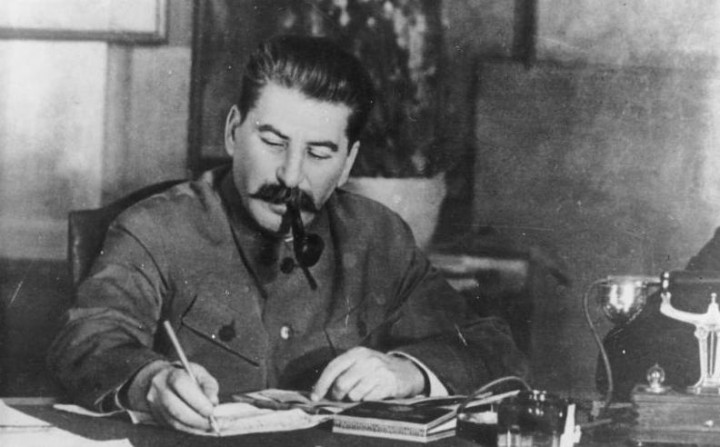 Stalin's crude 'theory' of 'socialism in one country' had no basis in Marxism / Image: public domain
Stalin's crude 'theory' of 'socialism in one country' had no basis in Marxism / Image: public domain
As late as February 1924, Stalin himself had still preached the exact opposite of ‘socialism in one country’:
"...can the final victory of socialism in one country be attained, without the joint efforts of the proletariat of several advanced countries? No, this is impossible...For the final victory of socialism, for the organization of socialist production, the efforts of one country, particularly of such a peasant country as Russia, are insufficient. For this the efforts of the proletarians of several advanced countries are necessary." (Stalin, Foundations of Leninism)
Yet, within months, Stalin took a completely different line:
"If we knew in advance that we are not equal to the task [of building socialism in Russia by itself], then why the devil did we have to make the October Revolution? If we have managed for eight years, why should we not manage in the ninth, tenth or fortieth year?" (Quoted in Carr, Socialism in One Country, Volume 2, page 181)
What made Stalin turn his ideas upside-down?
Basically, it was the changing balance of forces that emboldened the non-theorist Stalin to throw down the gauntlet to all the theorists of Marxism. The Opposition, the ideas of Marxism and the class demands of the workers were being silenced while the bureaucracy, increasingly arrogant, was prevailing.
The idea of revolutionary struggle against capitalism internationally (‘permanent revolution’) was entirely alien to the new masters of the Soviet Union. Stalin's thoroughly dishonest argument was not a theory in the true sense of the word (an attempt at explaining reality). It was nothing more than an attempt at burying the program of permanent revolution, of Marxism itself.
To cover their tracks, the bureaucracy increasingly ‘altered’ party history, and Marxist textbooks, to make it appear to the workers that their policy was the consistent continuation of Bolshevism. By November 1926, for example, Stalin felt able to declare:
"The party always took as its starting point the idea that the victory of socialism in one country means the possibility to build socialism in that country, and that this task can be accomplished with the forces of a singly country"! (Quoted by Woods and Grant, page 109)
Taken to its conclusions, Stalin's ‘theory’ denied the need for a revolutionary International. Defence of ‘socialism’ in the Soviet Union, in contrast to the building of socialism through world revolution, now became the primary task of the Communist parties internationally.
In practice, this meant uncritical support for the policies and national interests of the Soviet bureaucracy. (In 1943, Stalin himself confirmed this in the most blatant manner when he dissolved the Comintern – by then a bureaucratic shell – at the stroke of a pen, in order to prove to his wartime allies, the imperialist leaders Roosevelt and Churchill, that the Soviet leadership had abandoned all thought of world revolution.)
The Opposition were denounced as ‘pessimists’ and ‘cynics’ for questioning the bureaucracy's crude, anti-Marxist ideas.
In reality it was the Opposition who had consistently explained the need for industrialization to strengthen the basis of workers' rule in the Soviet Union. (For this, in turn, they were denounced as ‘super-industrialisers’!) But they had also explained that this in itself would not be enough to complete the transition to socialism.
On the other hand, cutting loose from the program of internationalism meant writing off the perspective of reconstruction in Russia in any real sense – i.e., as part of a socialist Europe. The bureaucracy's alternative was to rely more openly on the kulaks as mainstay of the ‘national’ economy. Bukharin, in April 1925, went so far as to blurt out:
"To the peasants...we must say: Enrich yourselves, develop your farms, do not fear that constraint will be put on you." (Quoted in Carr, Socialism in One Country, Volume 1, page 280)
This slogan came under attack because it was too blatant and it was dropped by the central committee, but the general idea became party policy.
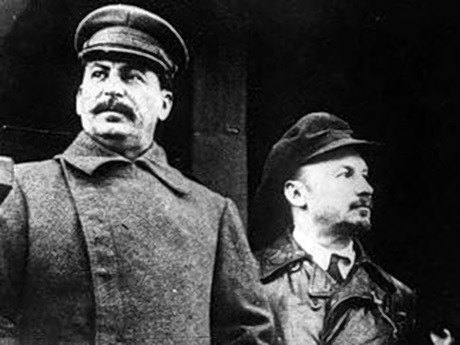 Stalin and Bukharin / Image: public domain
Stalin and Bukharin / Image: public domain
Before the year was out, Stalin was even considering whether to denationalise the land!
By this time the triumvirate was breaking up. Its purpose had been accomplished. Zinoviev and Kamenev had joined forces with the mediocrity Stalin out of hostility towards Trotsky; now they recoiled from the ruthless Stalin who had taken virtually all power into his own hands.
Political differences among the trio now began to surface.
At the party congress in December 1925, Zinoviev and Kamenev began to raise questions about Stalin's ideas. It was left to Trotsky, however, to develop a fundamental Marxist refutation of ‘socialism in one country’, and expose its inherent dangers.
Today the question has taken on even greater importance than in the 1920s. The powerful present-day Soviet regime has enormous influence in the mass movement internationally, especially in the underdeveloped countries. The bureaucracy's philosophy of ‘socialism in one country’ (or ‘national roads to socialism’) has become the conscious or unconscious starting point for many of the leaders.
Trotsky's reply to Stalin remains the clearest basis for answering these ideas and working out the Marxist way forward.
Why Marxism Stands for Internationalism
Trotsky demonstrated that the program of internationalism (now labelled ‘permanent revolution’) had never been challenged in the Bolshevik Party prior to 1924. Stalin's crude challenge, however, made it necessary to once again explain the question fundamentally.
Trotsky started with the basic ideas of Marxism. Civilization, he explained, advances through the development of the productive forces – through the struggle by people and classes in society to supply their material needs, in the process stimulating the development of science, technology, politics and culture.
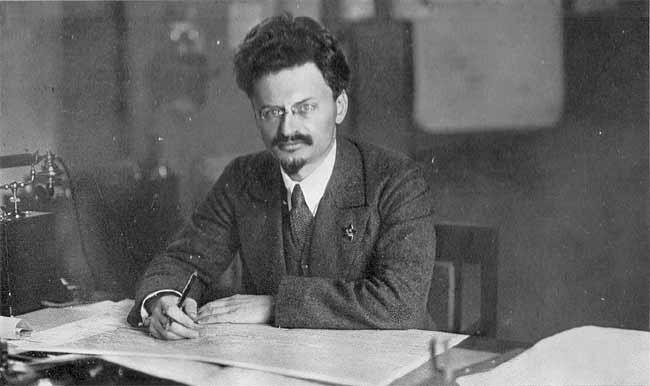 It was left to Trotsky to make a principled defence of Marxist Internationalism / Image: public domain
It was left to Trotsky to make a principled defence of Marxist Internationalism / Image: public domain
Social systems come into existence on the basis of the organization of production. A social system can only be swept away when it has come to the limits of its development, and a new revolutionary class, with the capacity to reorganize and further develop the forces of production, is prepared to take power.
The necessity for socialism arises out of the obstacles created by the capitalist system to the further development of the productive forces. The historical purpose of socialism is to develop society beyond the economic and political limits of capitalism, to new levels of abundance and freedom.
"Socialist society", as Trotsky explained, "can be built only on the most advanced productive forces...on combining, generalizing and bringing to maximum development the highest elements of modern technology...Socialism, however, must not only take over from capitalism the most highly developed productive forces but must immediately carry them onward...and give them a state of development such as has been unknown under capitalism." (The Third International After Lenin, pages 40-41)
The struggle and sacrifice to end capitalism and build socialism, in other words, could have no justification – and no attraction for the mass of working people – if it represented no advance (or a step backward) from the standards of living that capitalism is able to offer.
Why does socialist transformation make possible a huge leap forward even from the highest achievements of capitalism? On the one hand, because it frees production from the anarchy of market forces, the distortions of private ownership and the limits of national states. On the other hand, it liberates the collective ingenuity and creativity of the mass of working people from the repressive discipline of capitalist production.
Workers' democratic rule, in other words, is an essential political precondition for the transition to socialism and communism.
Why can this transformation not be carried through within the borders of one country? Precisely because capitalism has developed as a world system. The ‘most advanced productive forces’ are not contained in any single country; they depend on the combined efforts of the working class in whole series of countries, tied together through world trade. Certainly they could not exist in an underdeveloped country, such as Russia in 1917.
The transition to socialism – for control of the ‘most advanced productive forces’ – can only be an international process, depending on the conquest of power by the working class in at least a number of industrialized countries (which would seal the doom of the capitalist class on a world scale).
As long as workers' rule remains confined to a single country, it will face the combined hostility of the capitalists of the world, with vast economic and military resources at their disposal.
Stalin's crude argument, that the October revolution could have no other aim than the construction of socialism in Russia, therefore completely missed the point. Lenin, in one of many statements on the question, answered him in advance:
"Single-handed, the Russian proletariat cannot bring the socialist revolution to a victorious conclusion. But it can give the Russian revolution a mighty sweep that would create the most favorable conditions for a socialist revolution, and would, in a sense, start it. It can facilitate the rise of a situation in which its chief, its most trustworthy and reliable ally, the European and American socialist proletariat, could join the decisive battles." (Collected Works, Volume 23, page 372)
What ‘Socialism in One Country’ Really Meant
The Soviet Union could not overtake capitalism and advance to socialism because it did not dispose over the ‘highest productive forces’ within its boundaries. Even basic necessities for survival could only be obtained through trade with the imperialist powers.
The immediate challenge was to catch up with capitalism, to conquer the ‘commanding heights’ of the world economy, and so lay the basis for constructing socialism as an international system.
The Soviet Union's fundamental weakness, in other words, lay in its economic and technical backwardness compared with the advanced capitalist countries. Backwardness was the root of bureaucratization (see Section 6); bureaucratic rule excluded workers' democracy, and formed an absolute barrier to socialist transformation.
The bureaucracy persisted in seeing the international problems of the revolution in essentially military terms, and gambled on the ability of the Soviet Union to defeat future imperialist invasions.
As Trotsky pointed out, even the military threat of imperialism resulted from its technical superiority. But, he added, "it is not so much military intervention as the intervention of cheaper capitalist commodities that constitutes perhaps the greatest immediate menace to the Soviet Union.” (The Third International After Lenin, page 37)
In other words: the Soviet masses would defend their gains, and fight the threat of open counter-revolution. But demoralized and disillusioned by bureaucratic rule, they could not be expected to defend their own backwardness against a capitalist enemy apparently offering them a superior way of life.
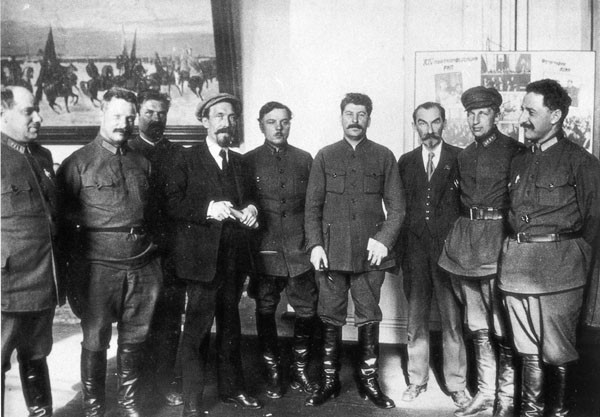 14th Conference of the All Union Communist Party / Image: public domain
14th Conference of the All Union Communist Party / Image: public domain
In the event it was not the armies of capitalist democracies that invaded the Soviet Union in 1941 but those of Hitler. With them, instead of ‘cheaper commodities’ for the Russian masses, they brought barbed wire and the gruesome paraphernalia of slave labour and extermination camps.
Subjected to barbarous racial repression by the Nazis, the Russian workers rallied heroically in defence of the Soviet Union.
Today the balance of forces internationally have swung massively against the imperialist powers, and there is no longer any possibility of capitalist restoration in the Soviet Union. The bureaucracy have diverted huge resources into military development, and transformed the Soviet Union into a nuclear superpower. The threat of imperialist invasion has effectively been ended.
But even this spectacular economic progress, possible only on the basis of a state-owned and planned economy, could not overcome the distortions in Russian society created by the rule of a privileged elite.
Bureaucratic repression stifled all initiative from below. The workers were driven forward through a combination of bribes and compulsion. The bureaucracy's soothing phrase of building socialism “at a snail's pace” (in Bukharin's phrase) made a mockery of workers' aspirations.
All it meant, in real terms, was the laborious struggle to develop the state-owned economy in a backward country – under their own rule.
Marx and Engels, as early as 1845, had anticipated why socialism could not be built under conditions such as these:
"This development of productive forces...is an absolutely necessary practical premise [of socialism] because without it want is merely made general, and with destitution the struggle for necessities and all the old filthy business would necessarily be reproduced." (From The German Ideology, in Selected Works, Volume I, page 37)
This insight was starkly borne out by the bureaucratic degeneration of the Russian workers' state. The bureaucracy could only build a society of inequality. With inequality came increasing corruption and police repression on the part of the bureaucracy and, among the masses, a grim battle of "each one for himself".
A letter from a kolkhoz (collective farm) worker, written in April 1930, summed up the new relations being created between the working people and their bureaucratic masters:
"The members of the kolkhoz have for two months received no pay...Fifty percent of the revenue goes to the kolkhoz treasury, fifty percent for taxes and rent. What remains for the workers? No one knows. The president pays himself several flour certificates each month and refrains from all physical labor..."
A factory worker in March 1930:
"They are squeezing us, and how! Twenty-five percent increase in the productivity of labour and 1.9 percent increase in wages. For three years wages have not varied, though production has very much increased. Five men to the brigade instead of six, without change of equipment. The system of bonuses is applied in such a way that...they should be paid every six months, but in reality no one hopes to receive any..." (Quoted by Serge, From Lenin to Stalin, pages 60, 61)
Socialism cannot be built under these conditions. The essential political condition for the development of socialism, created by the October revolution and destroyed by the bureaucratic counter-revolution, has still to be re-conquered: democratic working-class rule.
Originally published here

